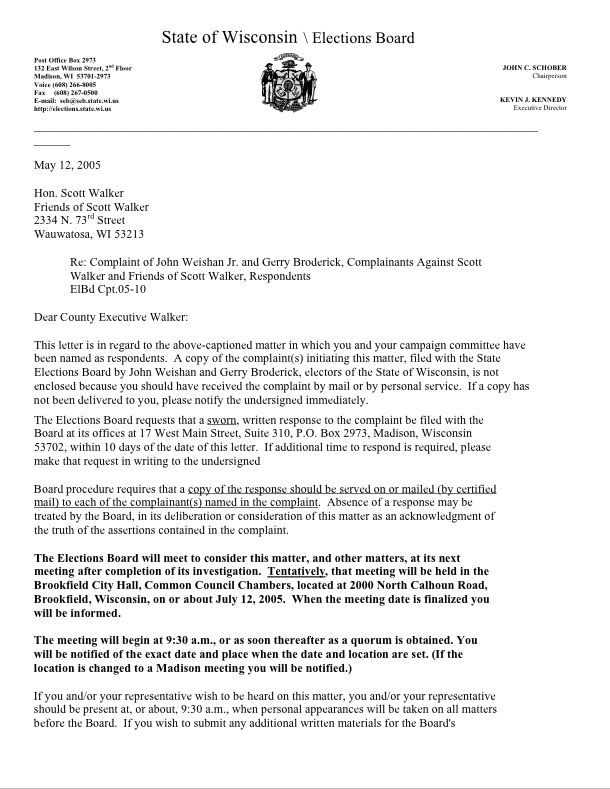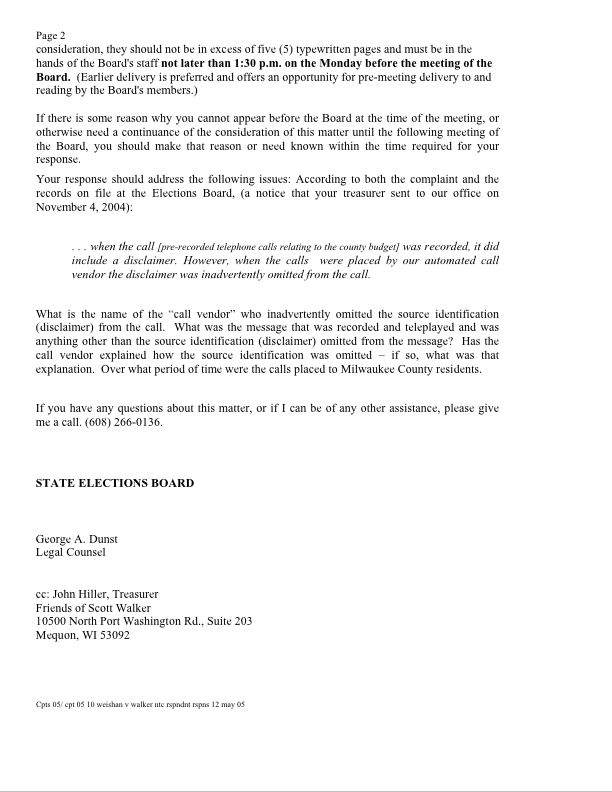State Elections Board Responds to Complaint Against Walker
Here in full are facsimiles of the letter sent by the State Elections Board to the Walker campaign.
John Weishan and Gerry Broderick File Complaint Against Scott Walker
MAISTELMAN & ASSOCIATES
For Immediate Release May 12, 2005
For More Information Michael Maistelman, 414.333.9700
Milwaukee County Board Members File State Elections Board Complaint Against Scott Walker
MILWAUKEE, WI – Milwaukee County Board members John Weishan and Gerry Broderick filed an official complaint today with the Wisconsin State Elections Board against Milwaukee County Executive Scott Walker.
“Scott Walker has tried to pawn himself off as a reformer, but time and time again he’s proven that he is part of the problem,” said Weishan. “Since becoming County Executive, Scott Walker has habitually broken the law and misused taxpayer money to further his political ambitions.”
The official complaint outlines specific details of how Scott Walker’s campaign illegally used campaign resources to communicate with 40,000 Milwaukee County residents while failing to include the identification of the political committee that paid for the communication. Walker admitted in a subsequent Milwaukee Journal Sentinel article that the campaign had paid for the calls and the disclaimer had not been included on the calls.
Wisconsin law clearly defines anonymous communications paid for with campaign funds as illegal and lays out both civil and criminal penalties to address these transgressions.
A complete copy of the PDF format complaint
Jest Sings Blues
Peter Jest, the owner of Shank Hall, is singing the blues, as he always does when a new live entertainment venue is planned for Milwaukee. In the past he has opposed the Milwaukee Theater, the Pabst Theater, and now he has set his sights on the proposed House of Blues, one of the venues planned for the Pabst City development.
He says that the new facility would take the “profit” from Shank Hall, since many bands that play at his bar would instead play at the House of Blues.
Jest says it is not right that Wispark receive city funds for the development of Pabst City, but bases his argument solely on the House of Blues, and not the other elements of the project.
There are others who feel that it is about time large national chains like the House of Blues recognize that Milwaukee is a premiere party town and that it is about time the residents of the area have a live music venue that provides a world-class experience.
I was in the House of Blues in New Orleans last month, prepared for a visit to what I thought would be a chain nightclub, and expecting maybe a signed B. B. King poster or a Buddy Guy guitar on the wall.
I was unprepared for the magnitude of the experience. The House of Blues was a sprawling enterprise with several entertainment zones, including a large auditorium / dance floor. But there was also food, open air spaces, and a dazzling collection of art.
Upon further research, I learned that the House of Blues Foundation is one of the nation’s largest collections of outsider art, overflowing with works by such notables as Mose Tolliver, Howard Finster and Prophet Blackmon among others. I came for the music and food, and stayed for the art.
It may be too soon to judge if Jest did himself or his cause any favors with his letter. For example, the following sentence would seem moderately intemperate: “the mayor is naïve and oblivious to the facts except that the Pabst City supporters helped get him elected and now it is payback for them. He is our Mayor Quimby.”
Well, for most people, such an insult to the mayor would sound intemperate or worse. Coming out of Jest’s mouth, it seems almost diplomatic.
[See the letter below]
Daily Reporter Revenue
The little-known Daily Reporter, circulation about 2,000 copies, calls itself “Wisconsin’s Construction, Law and Public Record Authority since 1897,” and for better than a century it was nothing more than a collection of legal notices. After its sale by the Woodmansee family to Dolan Media Company, the paper hired a couple of reporters and actually began to put real news into its pages. Still, the lion’s share of the Daily Reporter revenue comes from the aforementioned legal notices, which, by law in Wisconsin must be placed in a daily publication of paid circulation.
This latter provision has provided the Daily Reporter’s niche – it charges $189 per year for a subscription, which qualifies it on the “paid” part of the equation. But, since its press run is quite low, it is able to offer lower-priced advertisements than, say the Journal Sentinel, which clinches the contract for the paper. Other newspapers throughout the state carry legal notices, and towns, cities and villages are trying hard to limit the money they must spend on these notices.
Bills AB 257 and SB 126 would allow that summaries of legislative action be permitted rather than full text messages. This alone could save the governmental units many thousands of dollars per year.
Bill AB 35 would go even further – permitting legal notices to simply be posted on the internet.
Of course, Wisconsin’s newspapers are against these proposals, since the current system is the model of an advertising manager’s dream: if the ad is mandatory, you don’t need to spend money to get it. And, the more space an advertisement takes up with repetitive legal terms, the better.
So what kind of money is at stake here?
Milwaukeeworld asked city comptroller W. Martin “Wally” Morics, CPA to provide an accounting of the city’s expenditures for its legal notices in the Daily Reporter.
From January through March this year, or the first quarter, the City spent $22,702.44 on advertisements in the little paper. For the year 2004, the Daily Reporter charged $99,936.48 for the advertisements and official notices bought by the city.
The revenues from the county, which we have not yet requested, should be considerably more.
Mayor’s Landscape Awards
The sixth annual Mayor’s Landscape Awards were handed out at a low key ceremony at the Italian Community Center on May 4th. “City in Bloom,” sponsored in part by Greening Milwaukee, issues two awards per aldermanic district, plus a couple extras. Commercial, residential and “creative” awards were given at the event, which is among the most democratic activities in Milwaukee, ranging from the old African American woman whose garden is an oasis in a blighted neighborhood, to the retired South Side couple who can sure grow tomatoes, to the east side gay couple who apparently do nothing all day but make their garden fabulous.
Stereotypes? You betcha, and they were all there at the party. Mayor Barrett was his good-natured self, posing patiently for pictures with all winners, singly and individually. The media did not attend the event, which is a shame, since landscape is such an uplifting phenomenon, and the show itself was not a particularly rousing one. Perhaps it could be incorporated into a larger event – like a home show, or landscape show – to better get the message across.
Nominations are now being taken for next year’s landscape awards, to be awarded in May 2006. You can nominate your own garden – or a neighbor’s. Greening Milwaukee will notify nominees that “their garden has been noticed.”
For more information, go to www.greeningmilwaukee.org.
Walker’s News
Scott Walker’s race for governor included the issuance of a poll result this week to “Interested Observers” from John Hiller or Friends of Scott Walker. According to a memorandum from the Tarrance Group, which Hiller proudly notes is the employer of Brian Tringali, “Tommy Thompson and George W. Bush’s pollster,” we learn that Walker leads the pack for a republican primary ballot, with 39 per cent of the vote. He was followed by Undecided with 36 per cent of the vote and Mark Green with 25 per cent of the vote.
Trigani says that governor Jim Doyle is “particularly vulnerable” in the upcoming race. “Indeed, Doyle’s current standing is even worse than the previous Governor’s position, who was defeated.”
Trigani also implies that Walker will do well even among voters who have never heard of him once they learn of his commitment to lower property taxes. Thirty-four percent of the Republican electorate rate property taxes as the biggest concern.
Finally, the good news! We won’t have to listen to Walker campaign ads! That joy will be reserved for others.
We also learn from Walker’s campaign (“Lower Taxes. Higher Standards.”) that if Doyle or Green lose the governor’s race, then they’re out of a job. Not so Walker!
“Scott will be in place to fight for the interests taxpayers (sic) regardless of the outcome of the 2006 election. Scott’s term as County Executive runs through spring of 2008. He has a long term commitment to fight for the issues he cares passionately about.”
Lakeshore State Park Plans
A Community Open House was held at the Italian Community Center on Monday May 9th to give the public the latest update on Lakeshore State Park, hailed as “Milwaukee’s First State Park.” According to Brian Burke, who was at the event, Julilly Kohler questioned the generic name of the park, saying it does not take into account the location as the original “Gathering Place by the Waters,” a place where the Native Americans would come for sports, ceremonies and to trade news and goods. The native word for this place is now called “Milwaukee.” Kohler said she thought the park’s name could allude to the history of the place, which created a bit of a buzz at the meeting, since the name is rather generic. The best I can come up with is “Council Grounds State Park.” Anyway, your suggestions are welcome, so send them on, and milwaukeeworld will speed them on their way.
More Interesting News
The Assembly Democrats met at Turner Hall recently, drawing such luminaries as Fred Kessler, Barbara Toles, Jon Richards, Josh Zepnick, Pedro Colon, Shirley Krug, Sebastian Raclaw, Leonard Sobczak, John Finerty (Jr.), Linda Honold, Paul Nannis, Evan Zeppos and H. Carl Mueller. In his comments, Richards slipped when he called the mayor “Governor” Barrett, which I’m sure opened all sorts of wounds. … Real Chili is opening an outlet in Madison, which will probably be a success … Bella’s Fat Cat is opening its third location in Milwaukee. This one will be in the 2900 block of N. Oakland Avenue. … Michael S. Maistelman, a campaign finance and election attorney was recognized by Campaigns and Elections magazine as a “Rising Star” for his work for democratic candidates, particularly Thomas Nelson, the only democrat to beat an incumbent republican in last year’s assembly races. … Legacy Bank is suing SOL, Inc., the defunct shoe store on E. Brady Street … Bosley on Brady has opened, bringing white-tablecloth dining to the west side of that street in the space formerly occupied by Konohana. … Why did U.S. Bank dump Wisconsin president Andrew E. Randall? The company isn’t saying much, but Randall did come to Milwaukee with a gruff take-no-prisoners air. He did leave a divorce and an ex-wife behind in Ohio, where he had worked for the bank. He did show up here in Milwaukee with a girlfriend, which may have raised some eyebrows, since the pair were in the habit of enjoying $500 courtside seats at the Bucks games, pretty much right next to Terry Porter. Shall we say that Mr. Randall was not as low-key as we would prefer our bank executives here. Randall also jumped on many corporate boards since he appeared on the scene, and he does not appear to have left any of them. According to the Milwaukee Art Museum’s Vicky Reddin, Randall remains on the MAM board.
Let us not forget Milwaukee’s unofficial, but very real motto: Milwaukee – You Can Run. But You Can’t Hide.
Peter Jest Letter
May 9, 2005
To: Redevelopment Authority of the City of Milwaukee
Zoning, Neighborhoods and Development committee members
Milwaukee media outlets
From: Peter Jest
Shank Hall
Re: Follow up to comments at the May 6 meeting
Dear Commissioners,
Thank you for the opportunity to speak at the May 6 special meeting of the Redevelopment Authority last week. Here is a brief review of my objection to the Pabst City project getting any TIF money. I have also included a few other thoughts and facts regarding how this would affect the city in a negative way.
Over 80% of the House of Blues Chicago acts already play Milwaukee. Shank Hall would lose 3-4 shows out of the 20 shows we have a month to House of Blues. This is our profit. In the previous 11 days 3 of the last 9 shows at Shank Hall also played the House of Blues in Chicago.
Shank Hall gets people out on the town. We do better with shows Sunday-Thursday than Fridays and Saturdays. This is because the touring acts come through on weekdays and hit Chicago on the weekend. The restaurants and bars pick up a lot of pre- and post-show traffic from our events. They really appreciate the business especially on slower weekdays. This past April our performers and crew used over 100 hotel rooms in Milwaukee. This does not include fans that travel from all over the state and out of state to see their favorite acts at Shank Hall.
Shank Hall opened in 1989. Over 35 live music bars and clubs have gone out of business since then. It is a tough enough business without our tax dollars being used to get the competition here. We have a multi-racial staff and do multi-racial and multi-cultural shows. Just in April we have had bands from Nigeria, Scotland and England. They all love the intimacy and professionalism of Shank Hall. To many bands their annual visit to Shank Hall is one of their favorite stops. We would not have survived for almost 16 years if this were not true. Music fans also love Shank Hall for the uniqueness it brings to the city of Milwaukee. We should embrace our city’s uniqueness in our special nightclubs, restaurants and businesses. The House of Blues clubs are nice, but they are not Milwaukee and are not needed here.
Giving an enormous amount of TIF money to the Wispark conglomerate would put Shank Hall’s survival in jeopardy. Would the city really want to give tax money so they could put a “Starbucks” in to hurt Alterra or put in “Walgreen’s” to hurt the corner pharmacy? This is exactly what they are talking about with the House of Blues and it’s affect on Shank Hall and other venues.
Please turn their request down for this TIF money or at least table it for the summer. Please get some independent study done on the economic impact on current business. Do not use the Wispark numbers from their paid consultants. I could hire a consultant to say “the sun rises in the west and sets in the east” as long as that was my position. They are not telling the truth on the impact on current businesses. To say the entertainment “pie” will grow is insane. Look at one recent example of government-sponsored entertainment destroying a private business. The Milwaukee Theatre was rushed through with the promise of bigger shows and not hurting compettion. Their numbers are way off, they paid exorbitant bonuses to acts to get their business and have now run the Riverside Theatre tenants out of business. The mayor is naïve and oblivious to the facts except that the Pabst City supporters helped get him elected and now it is payback for them. He is our Mayor Quimby. We need the aldermen and commissioners to do what is right for the hard-working taxpaying business already here and turn down the TIF request. The only people that will benefit from this project are the developers and construction companies. They will make a fortune. Please stop this for the future of our city.
(Last updated December 29 2005 16:19:06.)
Political Contributions Tracker
Displaying political contributions between people mentioned in this story. Learn more.
- January 26, 2016 - Josh Zepnick received $50 from Paul Nannis
- January 25, 2016 - Josh Zepnick received $200 from Pedro Colón
- March 21, 2015 - Josh Zepnick received $100 from Evan Zeppos
The Roundup
-
Conservative Power Rises in Senate
 May 18th, 2015 by Steven Walters
May 18th, 2015 by Steven Walters
-
Buffett Tour on Hold
 Jun 27th, 2005 by Michael Horne
Jun 27th, 2005 by Michael Horne
-
Museum’s Wish List
 Jun 20th, 2005 by Michael Horne
Jun 20th, 2005 by Michael Horne


















